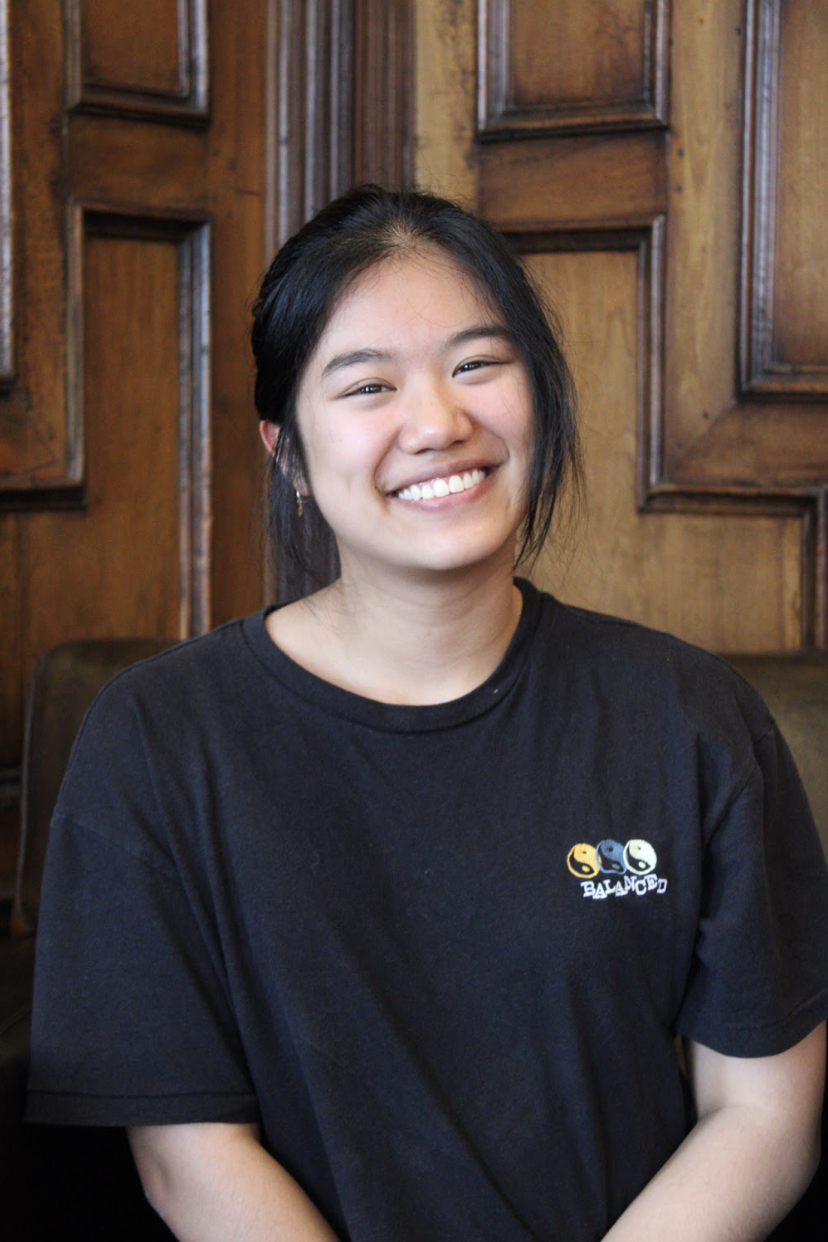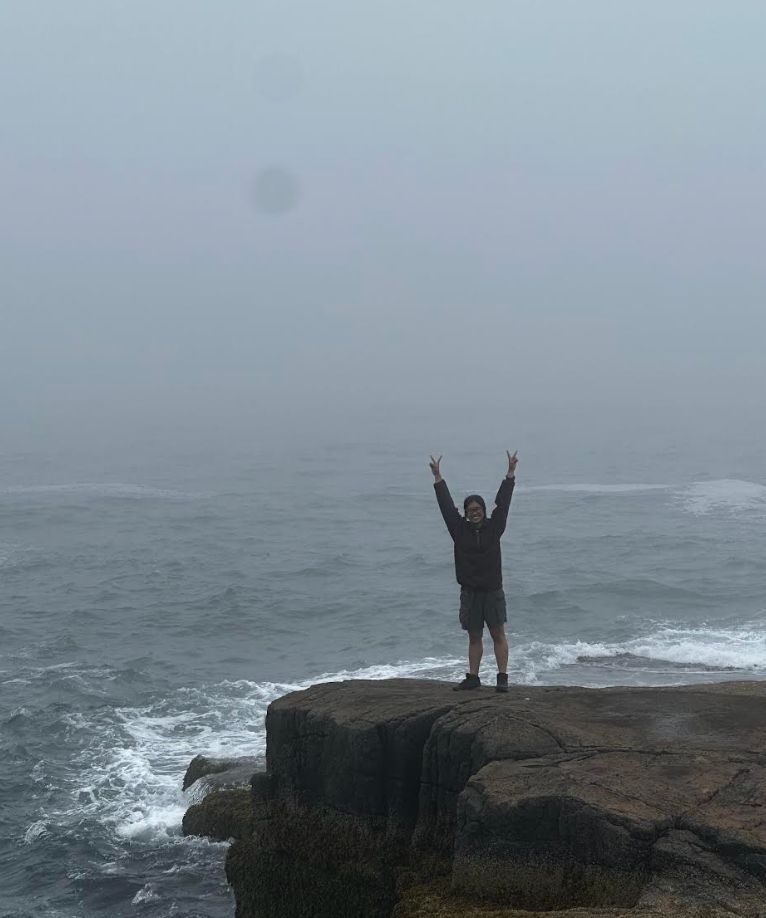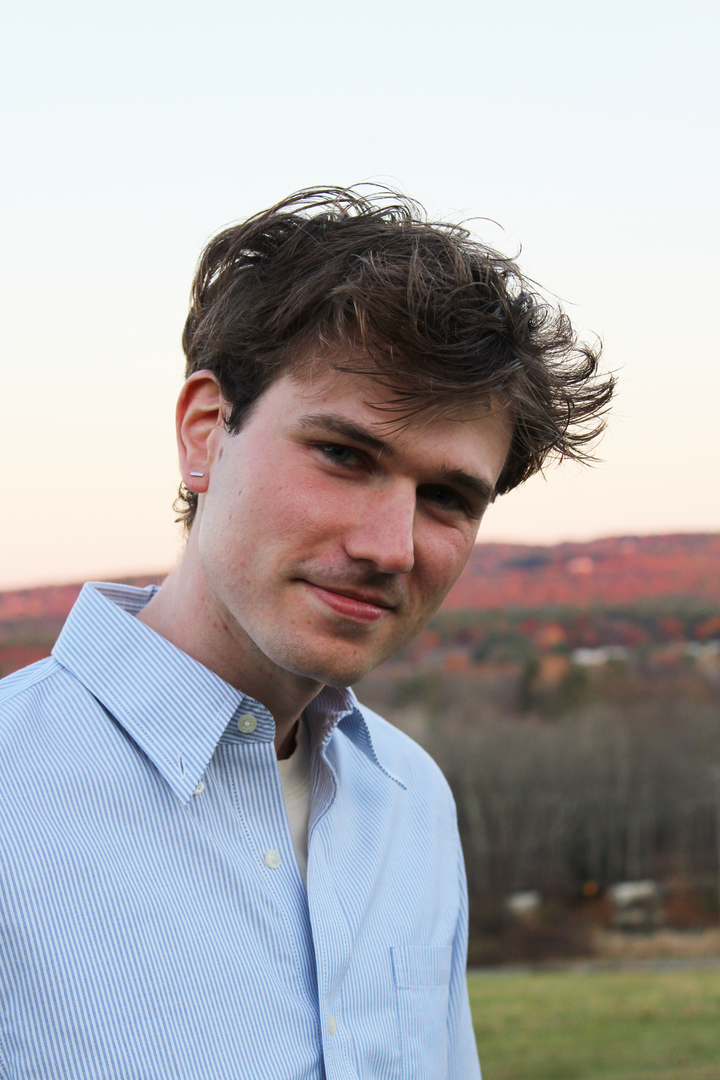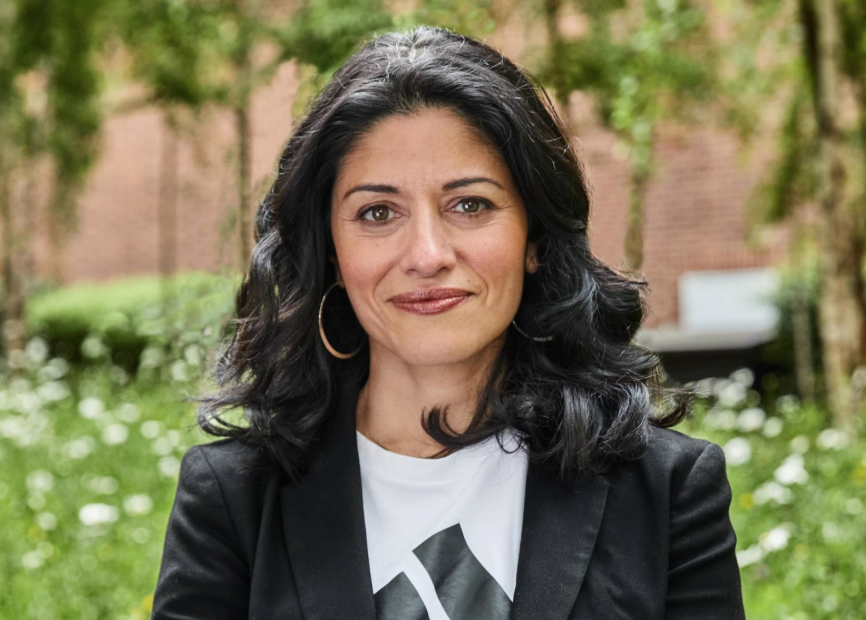Sarah Wu: Embodying the Liberal Arts
Sarah Wu’s intellectual curiosity, passion for community building, and commitment to education have been the root of her long lasting impact on the Amherst Community.

When asked about the nature of Sarah Wu ’25’s time at Amherst, Assistant Professor of Anthropology Victoria Nguyen shared, “Sarah embodies the ideals of an open curriculum at Amherst College.” When you talk to Wu, her esteem for education and learning is immediately clear. She values investigation, curiosity, and questioning in all aspects of her life. Wu’s interest in life is contagious, and it has led her to pursue vastly different and occasionally conflicting avenues. From coding and software engineering to creative writing, Wu has followed her passions to roles as Computer Science Club president, editorial intern at The Common, editor-in-chief of the Indicator, and soon-to-be triple-major graduate of Amherst College. It was a pleasure to sit down and talk with Sarah — I hope readers of this profile become as much of a fangirl as I have since getting to know her.
New York, New Hampshire, New School
Wu grew up in Long Island, New York. The child of parents who immigrated from China, she felt very claustrophobic in the very white community she was surrounded by.
From a young age, Wu’s interests were pulled from all sorts of directions, “I’d say I was a pretty quiet kid. I did a lot of everything. I think even as a kid, I was pretty confused about what I wanted to do,” Wu said. Wu explained that while many children of immigrant parents are pushed into certain career professions, she was given room to explore. “[My mom] still wanted me to have a stable job … but I think it was a lot less mired in the concept of being a doctor [or] being a lawyer,” she said.
Amherst’s specialization in faculty-student relationships, an emphasis on a liberal arts education, and the encouragement of all types of learning were why Wu chose Amherst.
Rather than coming to Amherst the year after she graduated high school, Wu deferred her admission a year to participate in City Year, “an AmeriCorps program where you get a bunch of pre-college or post-college students … and go into a place that needs more support in their education system.” During her City Year, Wu taught third graders in Manchester, New Hampshire.
The decision to do City Year before enrolling at Amherst was motivated by a couple of factors, namely that Wu wanted to see more of the world before settling somewhere for four years and doing more school: “I wanted to get out there and learn more things other than academics, and see how people cared about education.”
While her teaching chops might have been solidified during this pre-college work experience, Wu’s instructing roots started much earlier. Wu shared her passion for “being able to work with people who are learning something [and] making it fun.” Growing up, Wu tutored nine kids in violin, helping them perfect their technique, hold their violins properly, and encourage their love of music. She described how she would stuff tissues in between the student’s hands and the violin to help them master the practice of keeping their wrists straight.
Amherst Literary World
Once Wu arrived on campus, she got to work right away, both academically and within the campus community. During orientation, while most people were still struggling to find their way around campus, Wu was applying to be an editorial intern at The Common, Amherst’s literary magazine.
Wu had always gravitated towards writing, and the Common seemed a natural extension of this passion for literature. Specifically, she was “really inspired” by the type of short story writings the magazine published.
Wu has worked as an editorial intern at the Common for all four of her years at Amherst and was named the Thomas E. Wood ’61 Fellow for the magazine for her junior year. As an intern, Wu contributed to events like LitFest and the Tell it Slant Poetry Festival hosted with the Emily Dickinson museum, alongside working on promotions and grant writing. Wu shared, “A lot of the interns don’t just focus on editing stories, but [on] creating and running a magazine.” As she became a more senior fellow in the program, her goal became to ensure there was camaraderie between the interns and “making sure everyone had a chance to figure out what they wanted to do at the Common.”
Wu shared that the Common helped her find her literary passions at Amherst early on. “It led to a lot of my more specific interests [involving publishing and writing], and also knowing how to look for authors that matched my writing style,” she said. Beyond this, Wu has also published her own writing in the Common.
Outside of the Common, Wu also is a co-editor-in-chief of the Indicator, Amherst’s student-run literary magazine. During her time at the Indicator, Wu has over doubled the number of writers, with 56 authors contributing to the upcoming publication.
There is so much behind-the-scenes effort that goes into making sure the Indicator runs smoothly, including a matchmaking form at the beginning of every semester to pair each writer with an artist, a peer editor, and a staff editor. While the process is often complex and difficult, it does not deter Wu, who always prioritizes getting everyone together at an event to meet, managing “the logistics of figuring out how to get all of these intersecting people to sit at one table,” said friend and Co-Editor-in-Chief Gabby Avena ’25.
“Wu has a lot of those big, sweeping changes in her ideas that really did actually help the club,” Gabby Avena, Wu’s friend and Indicator co-editor-in-chief, said. In particular, Wu focused on orienting the magazine towards art submissions as well as writing.
Additionally, thanks to Wu, the position of art coordinator became a solidified role at the magazine, and has coincided with more collaborations between the Indicator and the art department at Amherst.
Wu also takes up the role as website designer for the club, which she devoted so much time to during her sophomore year that she called it “like a child.” Wu’s commitment to the literary community at Amherst is evident in her dedication to the promotion of authors and artists at the college.
Mixing STEM and Humanities
Wu has a tendency to take on large and complex projects related to technology. Her skills come from what she describes as her “useful major:” computer science.
Though Wu appreciates computer science for its logical thinking and practical application, she took up the role of Computer Science Club president as “more of a passion project.” During her first two years at Amherst, Wu noticed that the computer science department lacked community, had few post-college preparation opportunities, and did not foster close student-faculty relationships. As president, Wu has worked to fill in these gaps.
Wu is a triple major, also majoring in English and anthropology, but that was not always the plan. To her, majoring in English was natural: “I've always been interested in creative writing … Writing was a big part of how I navigated the world and understood it.” On the other hand, Wu did not mean to major in anthropology, but after realizing she had more than half the requirements, she declared the major during her senior fall semester.
Nguyen felt that anthropology was a natural fit for Wu because of the clear link between Wu’s “genuine kind of intellectual curiosity [and] way of asking questions” and the thinking and writing associated with anthropological work.
Many other double and triple majors describe their decisions to pursue their majors because the subjects complement each other. In Wu’s case, it is the opposite: “All my majors hate each other. There [are] little arguments that happen in my head all the time, because I think the priorities of each major are so, so different.”
While the differences between a STEM major and two humanities majors may be obvious, Wu also finds that her thinking is also separated between anthropology and English. To Wu, anthropology is all about writing “in order to capture what it means for someone to live their life through the various systems and structures they’re in.” While she describes her thinking around anthropology as “outsider-insider” — an outside audience doing in-depth research to find out what is going on inside someone’s life — she describes her thinking around English as “insider-outsider” — trying to express your own experiences through writing. “A lot of focus is telling your own story and saying, ‘This is why it's different from how someone else might view it,’” Wu said.
Blended Passion Projects
Despite these obvious differences in thinking, Wu often finds ways to combine her interests in unique and niche projects.
Wu’s thesis was a creative English project that she described as “super strange.” She shared that she realized later on in the writing process that the piece was essentially a reworking of an anthropological study. “You can see how it’s very inspired by theories that could have been gotten from an anthropological text, but rather than defining them or solidifying them, it keeps it as a story,” Wu explained.
The goal of her thesis was to deconstruct the popular notion of what it is like to build a home in Long Island. The project was very personal to her and her experience growing up in New York. “I was using this thesis as a way to figure out if I can learn from how other people or other objects or other things make home in Long Island, and see if I could find inspiration, and how maybe I could view Long Island differently,” she said.
Wu’s thesis advisor Winthrop H. Smith 1916 Professor of American Studies and English Lisa Brooks was impressed by the amount of labor Wu devoted to the project. “She went through so many drafts of her chapters, sometimes writing chapters entirely anew, and revising right up until the end,” she said.
Wu’s thesis had a complex and intricately woven structure, with vignettes instead of a linear plot. The piece has 108 pages and five chapters, each section weaving in and out of a specific fairy tale that acts as an overarching narrative for the chapter. Brooks described Wu’s thesis as a piece of writing that refuses containment: “It is inventive, vividly written, and episodic, giving impressions of places, landscapes, relationships.”
Wu also weaves together her interests through her current work with Assistant English Professor Nozomi Nakaganeku Saito. Wu aids Saito in her work on digital mapping on unexploded ordinances (UXOs) and military debris in Okinawa. “The goal is to observe the relationship of how military debris linger within Okinawa, [and] how it’s treated,” she said.
The project combines Wu’s interest in human history and the technical organization of data: “We have these different stories, and we map them onto a 2D map … it’s like Google Maps. You look at a location and you can see the story that appears. It’s called story mapping.”
As if she isn’t busy enough, Wu also works at Book & Plow farm, combining her interest in environmental anthropology and her care for storytelling. She was inspired to work on the farm by Brooks. At the beginning of the year, Wu focused on how to navigate non-human ethnographies. Wu shared an exchange she had addressing the apprehension she had about tackling this task: “I was like, ‘How do you talk to a tree?’ And Professor Brooks was like, ‘You don’t know what a tree is’ … It seemed like the best way to get to know what a tree is is to work on a farm.”
Wu’s passion for anthropology informs her commitment to environmentalism. She said that what she finds interesting about environmentalism is deconstructing and questioning the binaries we create for ourselves, asking questions like “Why do we consider these things wild? What becomes wild? … What is the environment?”
The Person Behind the Projects
In spite of her packed schedule and various responsibilities, Wu finds time for her own activities and for friends. Outside of activities and school, Wu is a big gym goer. “I love weightlifting … I can do six pull-ups,” Wu said. She also has begun the work to create a boxing club at Amherst; she began boxing in her junior year and has been practicing with the club at the University of Massachusetts, Amherst every Wednesday since.
Additionally, she loves cooking, especially for her friends, curating special “noodle nights” to bring all her people together over a shared meal. Avena described Wu as a sort of “celebrity friend,” sharing that “she’s very friendly and open. She pays a lot of attention to people.” To Avena, Wu’s investment in other people is based on a genuine “curiosity and interest” in their lives.
Hannah Koo ’25, Wu’s roommate for all four years at Amherst, said that watching her grow in confidence and seeing her responsibility develop has been a treat. Koo even shared that she joined the Indicator this year after hearing Wu talk about it for so many years: “It’s cool to see her originally starting off just excited to get involved in the English world here and now, especially senior year, to really take charge.”
When Avena and Koo were asked to describe Wu in three words, both struggled to summarize the friend that they were so proud of. They both agreed on the description of “silly.” The two also emphasized her dedication and hardworking nature, how much she cares about the people around her, and her natural kindness.

An Exciting Future
After graduation, Wu’s love for education, which started with her experiences as a tutor and in City Year, will take her to Bangladesh. There, she will be working as a teaching fellow for the Asian University for Women, leading courses in English and computer science to high school students for a year. Wu explained that she wanted to teach high school students specifically “in case I was more interested in academia in the future.”
The impact Wu has had on the Amherst community is immeasurable, and there is little doubt that her community organizing, creative writing, and website-building skills will make a world of a difference wherever she goes. Despite ultimately traveling across the globe for her next opportunity, Wu cites Amherst’s campus as a site of immense exploration, curiosity, and growth.
Wu encourages future Amherst graduates not to feel compelled to neatly fit together all aspects of their college life. “Explore, figure out things that you like, not everything that you like has to go into a career path into the future,” Wu said. Wu delights in the idea that not everything has to make sense right now; a clear picture might not develop until much later, and for her, that is the exciting part of learning and growing.





Comments ()